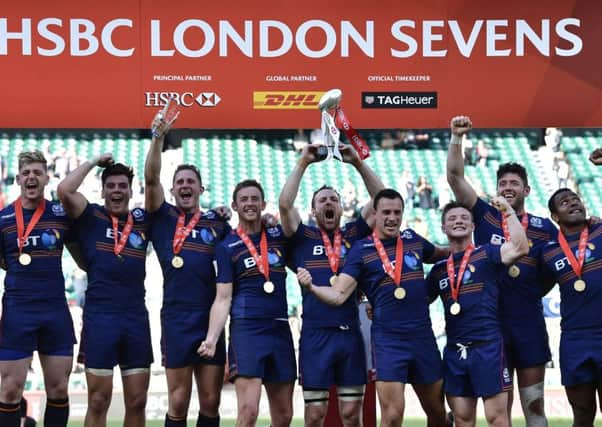Duncan Smith: Sevens independence worth more than medals


Despite exponential growth around the globe, the abbreviated form may not have the same profile as the 15-a-side top level of the game but the sight of a Scottish team beating England at Twickenham in a final and hoisting silverware was a moment to cherish. And yet, amidst the glow of glory, it seems a new threat to the nation that invented sevens is looming.
Reports this week have suggested the teams of England, Scotland and Wales are set to combine as Great Britain on the World Series from 2018-19 ahead of the Tokyo Olympics. They would remain as independent entities only for the Sevens World Cups and Commonwealth Games. The SRU response was: “We are preparing for next year’s World Series, Commonwealth Games [in Gold Coast, Australia] and World Cup Sevens [in San Francisco] competitions. We will not be commenting further at this time.”
Advertisement
Hide AdAdvertisement
Hide AdWorld Rugby is looking to trim the World Series, which doubles as a qualifying event for the Olympics, from 16 to 12 teams and a GB merger would allow the combined squad more time to prepare for the Summer Games as a unified outfit.
Sevens enjoyed a successful introduction to the Olympics in Rio last year and GB surpassed expectations by taking a silver medal, with Mark Bennett and Mark Robertson the two Scots featuring in the combined squad. It appears that other nations around the world are unhappy with the situation which allows the three Home Nations – Ireland do not field a sevens team on the HSBC world series – to nominate a qualifying team for the Olympics while still holding another two slots on the World Series circuit. In the year ahead of Rio it was England, who achieved a top-four automatic qualifying position for GB.
This all opens the door to the kind of hornets’ nest that unfolded in terms of Olympic football, where Scotland have resisted participating in GB teams for fear of jeopardising their independent status within Fifa. In general, rugby is far different from football, with the British nations still holding considerable political weight in union that goes beyond the traditional, precariously protected IFAB status within Fifa. But the introduction of sevens to the Olympics, which has seen nations around the globe invest in programmes, heaps the pressure on non-sovereign nations without IOC membership who stand in the way of others.
Two years after deciding to stick with an elite sevens programmes despite losing their hosting status of a leg in the circuit, the SRU now faces another test of their faith in the merits of investing in sevens.
With only two professional teams, international sevens is one of the few other outlets to expose young Scottish prospects to top-level rugby and MacRae spoke earlier this week of the vital development work it has provided for promising players.
It seems clear that, in the absence of a third pro team, if Scotland is to pursue a sevens strategy it has to be all in. Having a second-rate programme that competes on the second-tier European grand prix circuit, retaining a token participation in the Commonwealth Games and Sevens World Cup, is barely worth it.
Rio was great but the Olympics boils down to a couple of days of competition within an every-four-years, multi-sport extravaganza. Had GB bombed in the pool stage would anyone remember it?
The sevens programme provides development opportunities, livelihoods and magical moments like Twickenham last weekend.
That kind of gold is worth much more than a couple of silver medals.